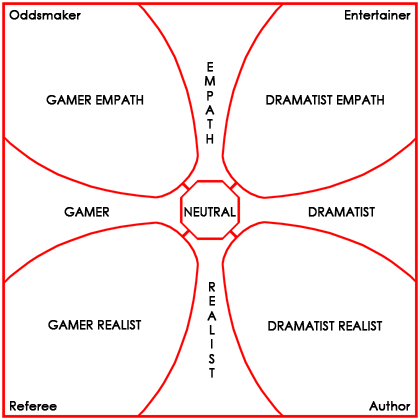
It's a well known social acxiom that when your goal is to have an amiable chat with someone you don't really know, never allow the topic of conversation to turn to politics or religion. A less well known social acxiom is never discuss whether or not you believe a game master should allow herself to fudge the rules or the dice rolls.
Gamers can get every bit as entrenched and passionately opinionated about that last topic as they can about the latest puppy-kicking legislation to come out of Washington (I mean, seriously: are you actually pro-puppy, or just some anti-kicking nutcase?). And since scientists have actually measured the difference in neural activity between liberals and conservatives, I expect they could get the same sort of data by measuring the neural activity in "rules lawyers" vs. "those gamers who think that fifty rules lawyers at the bottom of the ocean would be a good start". All of which begs the question, "Has anybody coined a pithy name for anti-rules-lawyers while I wasn't paying attention?"
It probably also means that the next time you're pulling your hair out, wondering why that fool on the other end of the internet won't admit to seeing the bright, shiny, elephant-sized truth about the right way to play a tabletop RPG, it's probably simply because he can't. And he's probably and sincerely wondering the exact same thing about you. The truths may differ, but the blindness remains the same.
As with most heated arguments, though, the silliest thing about these inevitable debates is that they're almost never about what they purport to be about, and thus can never achieve a satisfying conclusion for proponents of either side. e.g.: When you claim that there is no excuse ever for a game master to fudge, what you're really saying is, "To me. role-playing games are games with role-playing in; fudging is a form of cheating, and cheating is the quickest way to spoil a game." But there are also those players who approach RPG more as a form of improv theater, and for them that argument simply can't hold water.
So, in the interest of creating better communication, I offer the concept of "Role-Play Alignment". Like the alignment system introduced in the AD&D Player's Handbook, it's a dual-axis personality chart, but instead of "Good/Evil" and "Law/Chaos", it measures a player's personal hopes and expectations for how an RPG will be played.
The first axis, "Gamer/Dramatist", represents the relative importance the player places on mechanics vs. storytelling. The conflict between Gamer and Dramatist can be summed up by the question, "When is it acceptable for a GM to disregard rules and fudge dice rolls?" The most devout Gamer will answer, "Never." The most devout Dramatist will answer, "What are these 'rules' of which you speak?"
The second axis, "Empath/Realist", measures the relative importance he places on the metagame concerns of the players vs. the integrity of the game world. The conflict between Empath and Realist can be summed up by the question, "When should outside concerns of the players be allowed to alter the course of ongoing events within the virtual-reality of the game, or to retcon the game's history?" The most devout Empath will answer, "Any time." The devout Realist will look at you as if you're insane, find some way to scold you for stepping out of character without actually doing so himself, and get back to delivering his monlogue in pseudo-Elizabethan English.
In my experience, these are the differences in attitude that cause by far the most friction between role-players. If your personal holy grail is to totally immerse yourself within a fictional world, then of course you're going to get irked playing with someone who's just there for some laid-back adult company as a break from taking care of the kids. It's not that either of you is playing the game "wrong". You're each just hoping to get something different out of the experience.
A game master, then, could slap a role-playing alignment on his camapaign as a sort of short-hand social contract. A player would know at a glance if this is the sort of campaign he just has no stomach for, and neither player nor GM would wind up wasting the other's time. Alternatively, a player could advertise his own role-playing alignment in hopes of matching himself to the right gaming group.
It's a concept that could certainly endure further elaboration, and would lend itself nicely to being measured via personality test, but for now I simply throw it out there to see what thoughts it might provoke.


